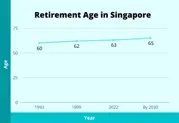What is the retirement age in Singapore?
Singapore, renowned for its robust economy and high living standards, is also facing the challenges of an aging population. The government has put in place several policies and initiatives to address these challenges, particularly concerning the retirement and re-employment of older workers. In this blog, we will explore what is the retirement age in Singapore and related policies.
Singapore retirement age changes over the years
The concept of retirement age in Singapore over the years has undergone significant changes. Initially, the retirement age was set at 55 years in the 1960s. However, as life expectancy increased and the workforce aged, there was a need to review and adjust this age limit.
In 1993, the retirement age was raised to 60 years, acknowledging the capability and willingness of older workers to continue contributing to the workforce. This change was part of a broader strategy to harness the experience and skills of senior workers, while also addressing the economic implications of an aging population. The retirement age was further increased to 62 years in 1999 and then to 63 years in 2022. These incremental changes reflect the government's approach to gradually extend the working lives of its citizens, ensuring both social and economic stability.

Singapore retirement age increased to 62 in 2022
Retirement age and re-employment age in Singapore
As of now, the statutory retirement age Singapore is set at 63 years. This means that employers cannot require employees to retire before this age. However, the re-employment age is set at 68 years, which mandates that employers must offer re-employment to eligible employees up to this age.
In March 2024, during the Ministry of Manpower Committee of Supply debate, it was announced that these ages will be raised further in 2026. The retirement age will increase to 64 years, and the re-employment age will rise to 69 years. By 2030, the retirement age is expected to be 65 years, and the re-employment age will be 70 years. These changes are part of a broader strategy to keep older workers in the workforce longer, thus contributing to the economy and alleviating the financial burden on the younger population.
Policies supporting senior employment
To support the continued employment of senior workers, the Singapore government has introduced several initiatives.
Part-time re-employment grant (PTRG)
The PTRG aims to encourage employers to offer part-time re-employment and other flexible work arrangements to senior workers. The grant provides up to S$125,000 to employers who meet the relevant eligibility requirements. Specifically, employers can receive S$2,500 per resident senior worker aged 60 and above, capped at a total of S$125,000 per company. This initiative not only promotes the retention of older workers but also supports their need for flexible working conditions.
Senior employment credit (SEC)
The SEC provides wage offsets for employers who hire senior workers aged 60 and above earning up to S$4,000 a month. The wage support ranges up to 7%, depending on the employee’s age. This scheme incentivizes employers to retain and hire older workers by reducing the financial burden associated with their employment.

Singapore supports senior employment to ease financial burden for employers
>>> See more topics: What is Singapore's minimum wage in 2024?
Eligibility for re-employment
Under the Retirement and Re-employment Act (RRA), employees who meet certain criteria are eligible for re-employment after reaching the retirement age of 63. To qualify, an employee must:
-
Be a Singapore citizen or permanent resident.
-
Have joined the employer before turning 55.
-
For employees who joined after turning 55, they must have served the employer for at least two years before reaching the retirement age.
>>> >>> See more: Best recruitment agency in Singapore
Protections against age-related dismissals
If an employee feels they have been unfairly dismissed because of their age, they can appeal in writing to the Minister for Manpower within one month of dismissal. This provision safeguards the rights of older workers and ensures they are not discriminated against due to their age.

Employee can report to Minister for Manpower for age-related dismissals
How Government addresses the challenges of an aging workforce
The increase in retirement and re-employment ages is part of a broader strategy to address the challenges posed by an aging population. By 2030, one in four Singaporeans will be aged 65 and above. This demographic shift necessitates policies that not only support the financial needs of older workers but also leverage their experience and skills. Singapore’s approach includes:
-
Incremental increases in retirement age: Gradually raising the retirement age allows both employers and employees to adjust to the changes. It provides ample time for businesses to plan their manpower needs and for workers to prepare for extended careers.
-
Supporting employers: Initiatives like the PTRG and SEC provide financial support to employers, making it more feasible for them to hire and retain older workers. This support helps offset the costs associated with higher wages and potential productivity differences.
-
Encouraging flexible work arrangements: Promoting part-time and flexible work arrangements helps older workers balance their work commitments with their personal needs. This approach ensures that senior workers remain engaged in the workforce without compromising their well-being.

Government addresses challenges of aging workforce by incrementally raising retirement age
>>> See more: Top Headhunting firms in Singapore: Finding the best talent for your business
Impact on employers and employees
After studying what is the retirement age in Singapore, we can understand the implications it holds for the nation's workforce and economic landscape. The changes in retirement and re-employment ages have significant implications for both employers and employees.
For employers
Employers need to adapt their workforce planning and management strategies to accommodate older workers. This includes:
-
Reviewing job roles: Employers may need to redesign job roles to suit the capabilities and preferences of older workers. This could involve creating more part-time positions or roles with flexible working hours.
-
Investing in training: Continuous training and upskilling are essential to ensure that older workers remain productive and competitive. Employers should invest in training programs that help senior workers update their skills.
-
Promoting inclusive workplaces: Creating an inclusive workplace culture that values the contributions of older workers is crucial. Employers should foster an environment where age diversity is seen as a strength.
For employees
For older employees, the changes mean more opportunities to continue working and contributing to the economy. However, it also requires:
-
Adaptability: Older workers must be willing to adapt to new roles and technologies. Continuous learning and skill development are essential to stay relevant in the job market.
-
Health and Well-being: Maintaining good health is critical for older workers to continue working effectively. Employees should prioritize their physical and mental well-being to sustain their productivity.
-
Financial Planning: Extended working years provide an opportunity for older workers to enhance their retirement savings. Effective financial planning is essential to ensure a comfortable retirement.

Singapore retirement age changes offer older employees more work opportunities
Understanding “What is the retirement age in Singapore” is vital. As the workforce ages, businesses must adapt. For expert guidance, connect with Aniday - Headhunter in Singapore. They specialize in talent management, helping businesses navigate retirement age policies. Stay competitive amid demographic changes. Contact Aniday now for tailored solutions.
Aniday's HR Services
Headhunting Service
Find and recruit quality candidates in just 1 week! Supported by 40,000 experienced headhunters in IT, Finance, Marketing… capable of recruiting in any region.
Headhunting Service ➔Employer of Record (EOR) Service
On behalf of your business, we recruit employees and handle payroll without the need to establish a company in markets such as Vietnam, Singapore, Malaysia, India, Indonesia…
Employer of Record (EOR) Service ➔